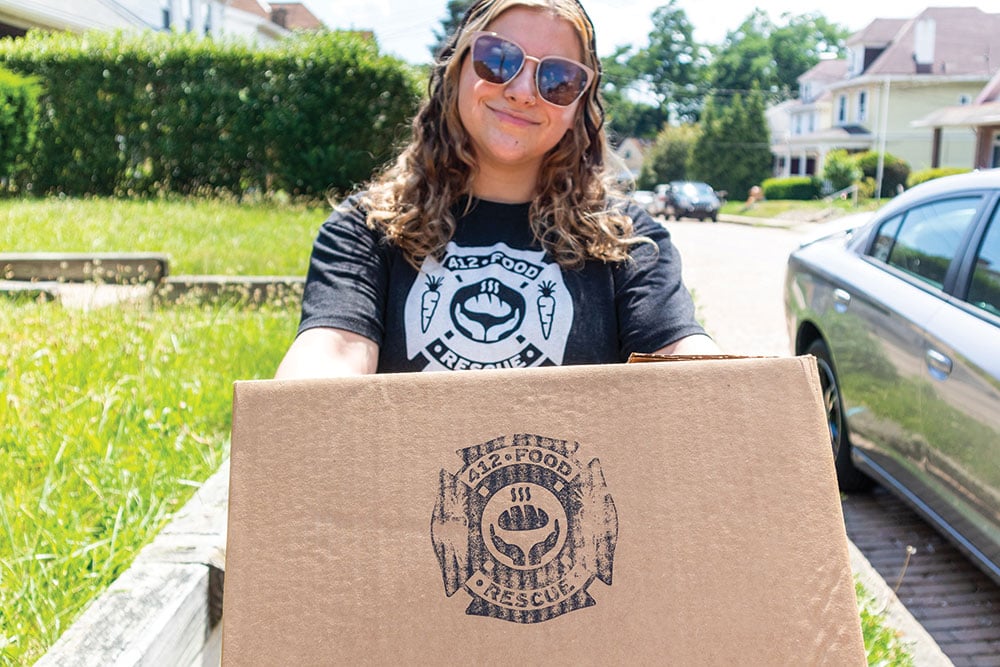Meet Pittsburgh’s New Class of 40 Under 40 Honorees
For more than two decades, Pittsburgh Magazine and PUMP have presented the annual 40 Under 40 list. Every year, 40 people who have been alive for less than four decades are chosen because of their career accomplishments, dogged volunteer work and commitment to the Pittsburgh region. Read on to learn more about some of our very best neighbors.
Click on the individual’s name or scroll down to view the entire list.
HAIR & MAKEUP BY TRAVIS KLINGLER
 Curt Conrad (31)
Curt Conrad (31)
Chief of Staff, City Council District 5
Local government should be two things: reliable and recognizable. And both require getting out into the communities being served. As the chief of staff for Councilman Corey O’Connor, Curt Conrad gets out a lot.
It’s typically Conrad who sits in constituents’ living rooms and tries to come up with viable solutions to nagging problems, such as installing that stop sign at the corner or ensuring the water is OK to drink.
“Government often gets viewed as an abstract, conceptual thing,” Conrad says. “But your local government is on the front lines of the things that affect your quality of life.”
For the past five years, Conrad has been instrumental in helping to establish some of O’Connor’s, and the city’s, most impactful legislation, such as the paid sick days act, which requires city businesses to provide sick time to full and part-time employees, and gun and firearm safety regulations, which would restrict assault-style weapons in the city.
 Latrice “Phoenix” Rose (29) Founder, Melanin Mommies PGH
Latrice “Phoenix” Rose (29) Founder, Melanin Mommies PGH
Photographer, Latrice Phoenix Photography
Growing up, most of Latrice “Phoenix” Rose’s mentors were men. But when she became a mother, she realized she needed a woman in her life to guide her through motherhood and work-life balance. So she started an online support group while pregnant that soon grew into a non-profit organization known as Melanin Mommies PGH, which offers mentorship to young, African American mothers ages 14 to 21.
Each woman in the program is connected with crucial resources, including parental education, professional development and mental health services. “Our goal is to help young moms to overcome negative family cycles and intergenerational trauma,” Rose says.
In 2018, Melanin Mommies also began fighting another battle with its #BlackBabiesDoSwim initiative. The mommy-and-me lessons not only promote parental bonding and combat the stigma that black children can’t swim, but they also ensure that fewer children are at risk in the water.
 Rebecca Himberger (35)
Rebecca Himberger (35)
Executive Director, Attack Theatre
At Attack Theatre, one of the city’s longest-running contemporary dance companies, “every day is new and weird and hard and different,” says executive director Rebecca Himberger.
Himberger began her career with Attack Theatre as an office assistant, but her love of the arts and her dedication soon propelled her to multiple promotions. Today, she is charged with strategic planning and tactical growth. In other words, she’s the one responsible for keeping the lights on.
“But the number one reason I do what I do is because I get to give artists the tools to do what they do best,” she says. Himberger is also not shy about sharing those tools. She helped to found Pittsburgh Emerging Arts Leaders and mentors up-and-comers in nonprofit management.
“This is a learn-by-doing industry,” she says, “and I’m not proprietary about what I know and what I’ve learned.”
 Joshua Friedman (39) Coach, ATP Race Consulting; Leader, Bend the Arc: Pittsburgh
Joshua Friedman (39) Coach, ATP Race Consulting; Leader, Bend the Arc: Pittsburgh
A lot of people talk about doing the right thing. Joshua Friedman actually does it.
As the co-founder of Bend the Arc: Pittsburgh, a movement of progressive Jews fighting for justice and equality, Friedman has organized a mourning march of thousands of people following the Tree of Life shooting; partnered with like-minded organizations to bridge racial, ethnic and socioeconomic divides; and even been arrested for protesting anti-immigrant policies in Washington, D.C.
“The 2016 election was a catalyst for many people to get involved in their communities doing all sorts of work,” Friedman says. “Bend the Arc: Pittsburgh sprang directly from that awakening.”
But you could argue that Friedman was woke to the country’s challenges long before 2016. His passion for sustainability, for example, means that his family does not own a car, preferring to walk, bike and use public transit wherever they go. Biking comes naturally to Friedman, who is Western Pennsylvania’s only USA Cycling Level 1 coach, guiding cyclists to nearly 1,000 podium results.
 Jordan Ball (29)
Jordan Ball (29)
Political and Operations Director, U.S. Sen. Bob Casey
In the early summer of 2016, Jordan Ball gave a talk at the National New Leaders Council convention in Washington, D.C., calling on progressives and political leaders to rethink their assumptions about rural America before they encountered political consequences.
When the speech concluded, several attendees patted him on the back and offered weak smiles, as if to say, “never gonna happen.”
Five months later, Donald Trump was elected. Since then, Ball, who has roots in Appalachia, has been a leader in bringing the concerns of small communities to national prominence with talks, op-eds and thought pieces.
This election cycle, he’ll be on the front lines of Pennsylvania politics with his recent promotion to statewide political and operations director for Sen. Bob Casey. “We shouldn’t define rural Americans by their problems,” Ball says.
“They may be smaller in number, but the importance of their issues impacts all of us. It’s not progressive to write off anyone.”
 Jenna Baron (28)
Jenna Baron (28)
Executive Director, Alliance for Refugee Youth Support and Education
As the executive director for the Alliance for Refugee Youth Support and Education, Jenna Baron’s official duties are to provide immigrant and refugee children with programming that helps to develop literacy, build confidence and create community.
But she often finds herself acting as friend and counselor, as well.
“My boundaries are pretty blurred,” Baron says, laughing. “My kids are my life.”
But she believes that kind of dedication provides a soft landing for children who are leaving their friends, language, customs and culture in another country to come to one that isn’t always as welcoming as it could be.
“There are a lot of places where they feel othered,” Baron says.
“It’s important for us to offer them a sense of belonging because that creates a confidence that goes with them to all of the spaces they will occupy in the future.”
 Girish Chavan (38)
Girish Chavan (38)
Director, Product Management, UPMC Enterprises; Vice President, Pittsburgh Chapter, Immigration Voice
In the United States, employment-based green card applications are judged on a person’s skill and employment, but they are allocated by country of birth. That means immigrants from less populous countries may wait mere months for a green card, while someone from, say, India could wait decades.
Girish Chavan has been waiting for more than a decade. At one point, he and his wife became so frustrated with the system that they returned to India. But Pittsburgh called them back.
“We were most happy when we were living here,” Chavan says.
“We have made friends who are like family, we identify with the values and warmth that make this city unique, and it felt more like home than any other place in the world.”
Their plight led Chavan, who by day is director of product management at UPMC, to join Immigration Voice and advocate for the passage of HR 1044, a bill that would eliminate per-country caps and allocate green cards on a first-come, first-served basis, making the system more fair and eliminating decades-long waits.
 Rossilynne Skena Culgan (31)
Rossilynne Skena Culgan (31)
Director, The Incline
In one of Rossilynne Skena Culgan’s favorite poems, author Rupi Kaur writes: “our work should equip/ the next generation of women/ to outdo us in every field.” It’s Culgan’s mantra.
“I have learned from an inspiring community of women — my mother, grandmothers, teachers, friends, mentors, and colleagues — and I believe in sharing that empowerment with the next generation,” Culgan says.
She does that through the 3 Cups of Coffee mentorship program through Pennsylvania Women Work and her involvement with the Women’s Press Club of Pittsburgh.
But, as the director for The Incline, Culgan also has the opportunity to equip Pittsburghers with the information and inspiration they need.
Through original reporting on its website and a quick-read morning newsletter that highlights reporting from across the city, The Incline seeks to, as Culgan puts it, “help curious Pittsburghers make the most of this city that we call home.”
 Bridget J. Daley (35)
Bridget J. Daley (35)
Attorney, Buchanan Ingersoll & Rooney PC;
Speaker Curator, TEDx
Pittsburgh Attorney Bridget Daley began her career as a writer and editor, so she’s always had a passion for other people’s stories.
In her role as a speaker curator for TEDxPittsburgh and TEDxPittsburghWomen, she gets to help bring those stories to life, coaching Pittsburghers with unique perspectives and ideas to refine their messages for the stage and a global TED audience.
“One of the most powerful and important things we can do is learn from each other,” Daley says.
“To take the time to truly listen to someone else’s story, we can gain insight, empathy and understanding.”
That was particularly true at the 2018 TEDxPittsburghWomen event, when Daley interviewed Joanne Rogers, wife of Fred Rogers, about the importance of kindness in front of a sold-out audience.
“Every speaker and idea shared from the TEDxPittsburgh stage has reinforced the notion that we have big thinkers and bold doers in Pittsburgh,” Daley says.
 Merecedes J. Williams (31)
Merecedes J. Williams (31)
Owner, Movie Scene Queen;
Project Assistant, Pittsburgh Public Schools
If movie buff and critic Merecedes Williams were to take her family to the movie theater tonight, she figures she’d spend about $150 on tickets and concessions.
For many Pittsburghers, particularly single parents, that kind of outing simply isn’t possible. So, using her studio connections, Williams became the Movie Scene Queen, offering families, schools and non-profits free tickets to movie premieres so that they can share in her love of film.
“I have the ability to serve people in a different kind of way,” says Williams.
“I can provide an outlet for families who would see going to the movies as a hardship.”
By day, Williams works for Pittsburgh Public Schools, where her most recent back-to-school event raised more than $40,000 in monetary and in-kind donations in support of students and their families.
 Stephanie Scoletti (34)
Stephanie Scoletti (34)
Director of Support Services; Founder and Director of Young Adult Cancer Support, Cancer Caring Center
When Stephanie Scoletti was diagnosed with leukemia at 19, she expected the treatment to be excruciating. What she didn’t expect was the feeling of isolation that came with it.
“It puts such a halt in your life at a time when you’re just starting to build your life,” Scoletti says.
The experience inspired her to launch the Young Adult Cancer Support group at the Cancer Caring Center. It’s the region’s only support program for 18-to-39-year-old cancer patients and survivors.
Scoletti not only hosts bimonthly support group meetings and organizes monthly social events, but she’s also awarded more than 300 financial grants that have helped young adult patients — many of whom are college students, new parents or family breadwinners — remain on solid financial footing while they recover.
“We’ve saved marriages and paid mortgages,” Scoletti says. “We’re not curing cancer, but we are giving people hope and a sense of normalcy.”
 Jamilka Borges (33)
Jamilka Borges (33)
Executive Chef, Independent Hospitality Group
For a single week after her parents’ divorce, 5-year-old Jamilka Borges and her mother were without a home. They slept in local parks and had little access to food.
“It’s a stamp on my memory,” Borges says. “My mother is an incredible woman, and I had an otherwise wonderful childhood, but for that one week, I was actually hungry and scared and cold, and that’s something no one should have to experience.”
It’s what fuels her dedication to expanding food access in the city. Borges sits on the advisory board for 412 Food Rescue and leads an annual fundraiser that brings in top chefs from around the globe.
She’s also a familiar face at children’s cooking camps and clubs, where she teaches participants how to make healthy meals.
Borges’ work at Bar Marco, Spoon and Independent Brewing Company may have earned her numerous accolades — she’s been a James Beard award semifinalist twice and was Pittsburgh Magazine’s 2018 Chef of the Year — but it has also provided her the platform she needs to push for change.
“Why not use that voice and power to advocate for a cause that’s close to your heart?”
 Claudy Pierre (35)
Claudy Pierre (35)
Owner, Eminent Hospitality Solutions
Operator, Arnold’s Tea
In 2014, diabetes forced Claudy Pierre’s grandmother to have her leg amputated above the knee.
It struck Pierre that the strongest woman he knew succumbed to a fate she could have potentially prevented.
“It really amplified for me how eating and food touches every single sense, every single sector and every single citizen,” Pierre says.
So Pierre, who operates a city catering business and a tea shop, developed the Empowerment Awareness & Training, or E.A.T., Initiative, a program that teaches food vulnerable families how to source and prepare healthy meals through cooking demonstrations and education.
For many people, that means retraining their palates to include fresh fruits and vegetables. “People say, ‘But it’s more expensive to eat healthy,’” Pierre says.
“No, it’s not more expensive to eat healthy. It’s more expensive to be on meds or in the hospital because you didn’t take care of yourself.”
 Emily Krull (34)
Emily Krull (34)
Vice President, Senior Manager of Corporate Social Responsibility, The PNC Financial Services Group
In 2019, Barron’s named PNC one of the country’s most sustainable companies.
That’s largely thanks to Emily Krull, who built the company’s corporate social responsibility program from the ground up.
Most notably, Krull developed the company’s first corporate social responsibility report produced in accordance with the Global Reporting Initiative in 2015 and ensured that each subsequent report has been more transparent than the last.
“In other words, our reporting has become more strategic, thoughtful and informative to those who care about PNC’s environmental, social and governance practices,” Krull says.
Krull’s team also works with partners across the organization to improve corporate practices. Earlier this year, she and her team worked with PNC’s Innovation and Performance Group in an effort to pursue 100 percent renewable energy by 2025.
Krull is also involved in PNC’s Women’s Business Development program, which helps the company attract and serve female financial decision makers.
 Patricia Culley (39)
Patricia Culley (39)
Senior Associate, Bohlin Cywinski Jackson
The updated Frick Environmental Center in Frick Park is one of only 23 structures in the world to earn a Full Living Building Challenge certification, a rigorous standard that requires buildings to give more than they take. And Pittsburgh architect Patricia Culley led the team who designed it.
Culley has long been committed to balancing design with environmental consciousness. In the environmental center, she accomplished that by using natural materials, such as locally sourced wood, and onsite energy and water, such as a geothermal system.
The result is a regenerative net-zero building that’s as beautiful as it is sustainable and serves as the gateway to Frick Park.
While Culley works on another Living Building certification at the Waldorf School, she coaches other architects through the process as an LBC ambassador and a facilitator for the Pittsburgh Living Future Collaborative.
“Each of us has a responsibility to leave our world better than we found it,” Culley says.
 Kerry Weber (38)
Kerry Weber (38)
Owner, Switch & Signal Skatepark
For Kerry Weber, skateboarding was always an escape.
“An outlaw thing,” he calls it.
What the opening of Switch & Signal Skatepark in a former bowling alley in Swissvale really exhibited is the power of skateboarding to connect.
“I think our park, our way of treating people, our acceptance and encouragement, really brings out the best in folks,” Weber says.
“Every day there’s a potential to change lives.”
Part of what has made Switch & Signal such a valuable part of Pittsburgh’s young adult community is its accessibility (it’s located along a bus line in a neighborhood with sidewalks) and flexibility (for example, camps are scheduled around schools’ days off and half-days/early dismissals).
Weber’s even been known to hold pop up camps on snow days, giving kids somewhere to go and allowing parents to make it to work. “We try to serve families while getting kids to do something active,” Weber says. “You can find a lot of joy just carving around on a board.”
 Jake Seltman (38)
Jake Seltman (38)
Executive Director, Grow Pittsburgh
To Jake Seltman, executive director of Grow Pittsburgh, a garden does more than provide its caretaker with a steady supply of nutrition. It also connects them to the land, to the community and to history.
“The one thing that brings us all together is food,” Seltman says.
“To me, there’s no better way to build community.”
Grow Pittsburgh, founded in 2004, is celebrating the 10th year of its Community Garden Program, in which Grow Pittsburgh staff teach how to grow food and promote the benefits of gardens, among them saving money and reducing food insecurity.
Seltman, who began his tenure at Grow Pittsburgh as the organization’s educational director, is passionate about the emotional and social benefits of gardening.
“You can take a kid who struggles in the classroom and have him in the garden watering plants, and he’s a different kid,” Seltman says.
“Those kinds of benefits are harder to track, but they’re just as important.”
 Victoria Snyder (33)
Victoria Snyder (33)
Executive Vice President, Ya Momz House Inc.;
Director of Programming, Hip-Hop on L.O.C.K.;
Producer, OpticVoices
Victoria Snyder is an award-winning vice president of the rapidly expanding multimedia company Ya Momz House and the director of programming for an arts-education program that helps local students find and use their voices.
“But diversity and equity education is what really sets my soul on fire,” she says.
That’s why Snyder is so proud of OpticVoices, a curated and interactive digital photo experience that asks users to have tough conversations about topics such as racism, oppression, homophobia and xenophobia.
Participants caption images taken by filmmaker Emmai Alaquiva that depict the pain and controversy surrounding the topics, and that caption, hopefully, sparks connection.
“Two people who felt they had nothing in common may share a single thread of pain,” Snyder says.
“There’s so much hate happening in our world. Healing work is so important in our community and in our country.”
 Barry Rabkin (35)
Barry Rabkin (35)
Director of Marketing, Near Earth Autonomy
Barry Rabkin made a name for himself leading brand innovation for Heinz-owned Ore-Ida. He’s used those corporate lessons, and a lifelong passion for technology and people, to create award-winning marketing strategies for some of the city’s most innovative and avant-garde startups.
“All startups are built off a deep understanding of people — what their needs are and what makes them tick — and developing solutions to their problems,”
Rabkin says. “Pittsburgh has a pretty rich ecosystem that’s ready to do that.”
Rabkin himself founded, grew and sold two online startups and has helped to brand many more, including Identified Technologies and Near Earth Autonomy, which is striving to make autonomous flight safe and accessible for all. He believes Pittsburgh has the right recipe for making startups work.
“Pittsburgh isn’t a rat race,” he says. “We have the mentality that we’re all in this together. I think it’s really healthy.”
 Kristy Joy Weidner (39)
Kristy Joy Weidner (39)
Owner and Clinical Director, The Village Center for Holistic Therapy;
Owner, inJOY Meditation Studio
Kristy Weidner sees it every day: People who are so overextended, stressed and exhausted by work and obligations that they have little time for friendships or self-care.
“In our society today, we’re really lacking a sense of belonging,” she says.
So that’s exactly what Weidner tries to provide at The Village Center for Holistic Therapy, where clients can receive traditional therapy services in addition to wellness activities, such as yoga and meditation, to balance their mental, physical, social and spiritual wellbeing.
Her desire to offer people a sense of belonging also inspired Conversations to Connect, a podcast where Weidner and her best friend, also a therapist, discuss life experiences and mental health in a frank and friendly way.
“I really take a person-centered approach to everything,” Weidner says. “I believe the more people foster community connections, the more they help others, the more satisfaction they have in their own lives.”
 Nisha Blackwell (33)
Nisha Blackwell (33)
Founder and CEO, Knotzland Bowties
In middle school, Nisha Blackwell’s mother and grandmother would bring home bags full of used clothing and tell her to take what she wanted; at the time, thrifting was not trendy. In fact, it was considered pretty gauche.
But Blackwell had vision and a decidedly creative streak, so she plucked out the materials with the most potential, reworking and hand-sewing until she had designed an entirely new garment.
“It went from, ‘What the heck are you wearing?’ to, ‘That looks cool!’ pretty quickly,” Blackwell says. And now, Blackwell has transformed her middle school hobby into a thriving business.
She is the owner of Knotzland Bowties, a company that creates unique and artful neckwear while striving to reuse materials, cut down on waste and provide fair wages and training for local women artists.
“I wanted to combine all of the things I thought needed to exist in the world,” she says.
 Aaron Arnold (32)
Aaron Arnold (32)
Executive Director, Prevention Point Pittsburgh
The Centers for Disease Control estimates that 130 people die in this country every day from opioid-related drug overdoses.
As the executive director of Prevention Point Pittsburgh, Aaron Arnold is working to change that.
In addition to offering a needle exchange program and STI testing, Prevention Point provides opioid users with free naloxone access and training, as well as other services. It is, quite literally, a lifeline — a critical support system for people who often get little support.
“From the outside, it might be tempting to look at someone who is struggling and to think their hardships are their own doing,” Arnold says.
“But what we’re really seeing is the resiliency of these individuals in the face of systems that have failed them repeatedly. We have to realize that it doesn’t do any good to try to fix so-called ‘broken people’ if we don’t have a critical eye on the systems that broke them in the first place.”
 Ashley Comans (32)
Ashley Comans (32)
HYPE Project Coordinator, Allegheny Partners for Out of School Time;
School Board Director, Wilkinsburg School District
In 2016, when Wilkinsburg mayoral candidate Marita Garrett suggested Ashley Comans run for school board, Comans balked. What did she know about politics?
But the more she turned it over in her head, the more enamored she became with the prospect.
“It made sense,” Comans says. “I cared about the issues, I already love to talk, and it’s second nature for me to be a voice for people.”
That fall, she won the election and has become a respected driver of change in the district.
“It was amazing to me to learn how much control a school board has,” Comans says. “People don’t understand how many decisions … have a direct impact on them.”
In 2018, Comans was also elected a Wilkinsburg Democratic committee woman. It won’t be her last election.
“I have goals for bigger offices, and I want to be as prepared as possible,” she says.
 Sarah Rosso (37)
Sarah Rosso (37)
Executive Director, Hugh Lane Wellness Foundation
Sarah Rosso has spent much of the past 16 years focused on mental health issues in the LGBTQ+ community.
Rosso has helped to coordinate Pittsburgh Pride events by volunteering with GLCC (Now the Pittsburgh Equality Center), bring SafeZone training to college campuses and develop LGBTQ+ policies and trainings for organizations across the region.
Now, as the executive director of the Hugh Lane Wellness Foundation, which offers access to holistic wellness and fitness services, Rosso can also look to expand access to healthcare.
“What I’m most excited about is that I have the opportunity to leverage my public health background and focus on an integrated approach to serving the LGBTQ+ community,” Rosso says.
The Hugh Lane Wellness Foundation also runs an Affirm series for LGBTQ+ youth, which helps them to build leadership skills and navigate relationships with caregivers who are not always supportive.
“We want to give LGBT-identified youth a safety net and a soft place to land,” Rosso says.
 Itha Cao (29)
Itha Cao (29)
Policy Analyst, City of Pittsburgh, Mayor’s Office;
Owner and Chef, The Hungry Cao
Itha Cao would like you to take a moment to consider all of the mundane, but necessary, tasks that require digital literacy: signing up for social services such as SNAP and WIC, completing a homework assignment, banking, applying for a job. She could go on.
“We need access to technology if we are going to move forward as a tech city,” Cao says. And it’s her job as a policy analyst in the mayor’s office to ensure that all Pittsburghers have it.
To that end, she’s helped to implement free, after-school tech programs for kids and partnered with public housing authority residents to provide digital training and desktop computers.
She does all that while operating The Hungry Cao, her cleverly named dining experience that aims to introduce customers to and educate them on authentic Chinese food and its history — “it’s a cuisine that doesn’t have any status,” she laments — while using the proceeds to support nonprofits and charities that benefit women and minorities.
 Daniel C. Conlon (36)
Daniel C. Conlon (36)
Attorney, Tucker Arensberg, PC
When Daniel Conlon arrived in Pittsburgh, he accepted the depiction, offered by acquaintances, of the city as an “undiverse, closed community.”
But eight years later, Conlon, who grew up in Mexico, challenges that categorization.
Today, he hears Spanish on the bus, sees small, thriving Hispanic communities in city neighborhoods and represents a growing number of Latino business owners in his practice.
“I think part of the reason people are coming here is because of the work of places like the Latino Community Center,” he says.
Conlon is the center’s board president and a tireless volunteer who supports the Latino community by mentoring students at Beechwood Elementary School, connecting new members of the community with legal and mental health services and lending pro-bono legal help to the Pittsburgh Hispanic Development Corporation.
“I wanted to be connected to a group that was helping to elevate our community in the county and the state, and that’s what the center is doing,” he says.
 Brooke T. Anderson (39)
Brooke T. Anderson (39)
Office Managing Principal, Pittsburgh Tax
Central Region Leader, Private Client Services, BDO USA
Brooke Anderson earned two leadership positions at BDO USA — including one as the 100-year-old firm’s youngest, female office managing principal — before her 37th birthday.
She decided that wasn’t enough. She wanted to nurture the next generation of potential leaders, perhaps finding one who could outpace her success.
“Simply stated,” she says, “mentorship is the right thing to do.”
It’s why Anderson has worked with Grow Up Great; Leadership Pittsburgh; and Strong Women, Strong Girls, among others.
“I have had the great honor of receiving that very guidance, support and mentorship in my life and believe that it is my responsibility to pay it forward,” she says.
“It’s so rewarding when you see the ‘it factor’ in someone and help build their confidence by providing them with opportunities to step up and take the lead … And, what’s even greater is to see them do the same for someone else.”
 Michael J. Trettel (39)
Michael J. Trettel (39)
Director of Business Development, i+iconUSA
During the annual Pittsburgh Plunge, participants shuck their clothes and jump into icy river (or pool) waters to raise money for the Special Olympics.
A Super Plunger takes it to the next level, dunking 24 times in 12 hours.
But this past year, a bitter wind forced Michael Trettel and his fellow plungers to take the super plunge in near-record time, dipping 24 times in just six hours and raising $12,500 along the way.
“The athletes are there to cheer you on, which makes it so much easier,” he says.
Trettel is a member of the board of directors for Special Olympics Pennsylvania and serves on its development and campaign committees. He’s also a familiar face in the stands.
“The best part about the Special Olympics is that you get to work so closely with the athletes and their families,” says Trettel.
“When you see their reactions, you’re seeing the impact of your work firsthand.”
 Severin Hacker (35)
Severin Hacker (35)
CTO and Co-Founder, Duolingo
In 2018, Duolingo co-founder Severin Hacker rented a billboard in San Francisco and adorned it with a scintillating message for those in the ultra-expensive, startup-friendly Bay Area: “Own a home. Work in tech. Move to Pittsburgh.”
The gimmick was, admittedly, a business-minded one.
“When we talk to experienced job candidates for Duolingo who we want to relocate from Silicon Valley, they often say, ‘I’d love to work for Duolingo, but what if, for whatever reason, it doesn’t work out? There is no other similar startup in Pittsburgh, so I would have to move back,’” Hacker says.
“We need a healthy tech startup ecosystem in Pittsburgh so the best people in the world have multiple options. It’s good for Duolingo and Pittsburgh if we can attract, and retain, the best people.”
So Hacker has dedicated himself to helping other city startups and entrepreneurs, investing in several locally-based tech companies and organizing a monthly angel investor meetup.
 Kyle Chintalapalli (39)
Kyle Chintalapalli (39)
Vice President, Business and Economic Development, Pittsburgh Regional Alliance
During his time in the mayor’s office and at the Urban Redevelopment Authority, it was Kyle Chintalapalli’s job to safeguard city residents by ensuring responsible growth and development.
For example, he helped to implement $30 million in development funds to Larimer and to preserve affordable housing in the Hill District. But his current job at the Pittsburgh Regional Alliance requires him to generate solutions on a much larger scale as the nation takes notice of Pittsburgh’s assets.
“We have the opportunity to build the economy we want,” Chintalapalli says.
“There’s a lot of outside interest that the city hasn’t seen in generations, but that’s also a challenge for those of us in the public/private sector to ensure that it happens in a way that’s accessible to all folks who have been here and weathered the hard times. We need to make sure that they — and their kids — can share in that growth.”
 Samantha Stedford (38)
Samantha Stedford (38)
Director of Customer Experience,
Allegheny County Airport Authority
There’s nothing better than travel to teach you about yourself and about the world,” says Allegheny County Airport Authority Senior Analyst Samantha Stedford.
But for Pittsburghers with cognitive or physical challenges, travel can also be a frustrating experience.
Stedford wants to change that by increasing airport accessibility.
She recently served as project advisor for the new 1,500-square-foot sensory room at Pittsburgh International Airport, which helps travelers on the autism spectrum escape from the stress and noise of a bustling terminal.
“I’ve heard from families who never dreamed of taking a trip that are now able to travel,” Stedford says.
“We’re opening up the world to people who never thought that was possible.” Her next goal is to turn Pittsburgh’s new airport terminal into the most accessible in the world and a model for other airports to follow.
“We want Pittsburgh to lead the way,” she says.
 Tara Matthews (28)
Tara Matthews (28)
Senior Digital Services Analyst, Department of Innovation and Performance, City of Pittsburgh;
Principal, Nonius Consulting
Whether you want to keep track of development in your neighborhood, monitor government spending or track a city snowplow, the city’s Open Data program allows you to do so.
Tara Matthews has been with the program from the start.
“The phrase I like to use when describing the city’s Open Data program is democratizing data because we want civic data to be accessible and useful to everyone, whether you’re a seasoned power user or not,” says Matthews, the senior digital services analyst tasked with bringing the program to life.
She also was a lead organizer of the Inclusive Innovation Summit, an annual event that brings local organizations and businesses together to showcase their vision for inclusion in Pittsburgh.
 Andrew W. Johnson (37)
Andrew W. Johnson (37)
Executive Director of Community Partnerships and External Affairs, Community College of Allegheny County
Andrew Johnson doesn’t just believe in mentorship; he believes in intentional mentorship.
“You can’t take a cookie cutter approach to mentoring people,” Johnson says. “I can’t handle all black males the same. They’re not the same. You need to build a rapport, get to know them and get to understand their background before you can provide what they need.”
Johnson did just that as a student success coach at the Community College of Allegheny County and a program assistant for the Black Male Leadership Development Institute. But, in his new role as director of community partnerships at CCAC, he also gets the chance to look at the big picture, implementing systems that pave a clearer path to success for at-risk youth.
“Those who have opportunity need to use their position to help those that don’t,” Johnson says. “As Spider-Man would say, ‘With great power comes great responsibility.’ That’s absolutely true.”
 Lauren Stoner (34)
Lauren Stoner (34)
Social Worker, Allegheny County Office of the Public Defender
In traditional public defense, lawyers work to get the best legal outcome possible for their clients.
In holistic defense, a satisfying legal outcome isn’t enough.
Instead, a team of social workers, investigators and attorneys work together to address the underlying issues that led the client to the criminal legal system in the first place.
As a social worker in Allegheny County’s Office of the Public Defender, Lauren Stoner is a critical part of that holistic defense team.
“This work is ultimately about humanity and showing the people that we work for, and with, as a human, with dignity and worth in this world,” she says.
Stoner recently joined a coalition that includes retired state parole office Joyce Douglass, the Pittsburgh Foundation and many others to enact Driven to Work, an ongoing campaign that has ended driver’s license suspensions for people convicted of nonviolent, non-vehicular crimes.
“It’s a tiny step in the right direction for our clients,” she says.
 Josh Corcoran (32)
Josh Corcoran (32)
Founder/CEO, Spare Change;
Director of Business Development, Deeplocal
One night, when Josh Corcoran was in between jobs and tired of sending out his resume, he gathered a few musically inclined friends and headed down to the South Side to play on the street. As they were packing up, a man approached, asking for spare change.
Corcoran gathered the coins and crumpled bills in his guitar case and handed the man all of it.
Spare Change was born.
The startup partners with musicians to raise money for nonprofits such as 412 Food Rescue and Best of the Batch Foundation.
In the early days, Corcoran posted videos to Facebook and YouTube and, as the word spread, his vision grew.
“We asked, ‘How can we make this bigger and better and help more people along the way?’” he says.
Spare Change is now focused on long-term partnerships. One with Pittsburgh’s Nox Boys has already raised $700 (or a year’s worth of school supplies for 28 students) for the Education Partnership.
“It’s literally pocket change adding up,” Corcoran says.
 Natalie E. Ahwesh (35)
Natalie E. Ahwesh (35)
Vice President, HUMANE ACTION Pittsburgh
In fewer than five years as vice president of HUMANE ACTION Pittsburgh, Natalie Ahwesh has helped to pass 14 animal protection laws, including those that hamper puppy mills and halt pigeon shoots.
But the victory Ahwesh counts as the most important is what’s known as the bullhook ban, which protects animals by outlawing training instruments that cause pain.
It’s the reason the Shrine Circus didn’t visit Pittsburgh in 2019.
The law took years to pass and required a lot of public education, particularly for those who have fond memories of attending the circus but little understanding of what happens behind the curtain.
“Our biggest challenge is making sure that the laws we’ve worked on are understood and enforced,” Ahwesh says.
Her next mission is a plant-based eating challenge called Heart of a Hero, designed to curb animal suffering and bring awareness to the environmental hazards of meat production.
 Lauren O. Wallace (29)
Lauren O. Wallace (29)
Director of Undergraduate Recruitment, University of Pittsburgh
The most important word in higher education recruitment begins with an “A”: access.
“No student in Pittsburgh, a city thriving with educational options and even more social advocates, should be forced by their circumstances to decide that college is not for them,” says Lauren Wallace, the University of Pittsburgh’s director of undergraduate recruitment.
In addition to supervising and developing strategy for Pitt’s recruitment office, Wallace helped to found, and now chairs, the advisory board of the Pittsburgh Admissions Collaboration. The college access program is a partnership between Pitt, the Community College of Allegheny County and Pittsburgh Public Schools and provides a pathway to college beginning in the sixth grade.
“Students facing issues like food insecurity at home need more than the faith of college representatives to reach higher education. There needs to be an entire system behind our students pushing toward, and providing for, their success,” Wallace says.
 Shannon Edwards (34)
Shannon Edwards (34)
Clinical Forensic Psychologist; Owner, Edwards & Associates
Historically, psychologists have shied away from public policy and focused on treating individual patients. But watching her patients, particularly those with serious mental illnesses, endure a seemingly never-ending cycle of incarceration, institutionalization and homelessness spurred Shannon Edwards to begin talking — a lot.
“Sociopolitical issues are often taboo or difficult to talk about, and people often don’t want to fund those who have problems with incarceration and mental illness,” she says.
“The only way we’ve ever affected change at a macro level is by speaking out about it.”
Edwards, who served as the director of mental health at the Allegheny County Jail before creating her own forensic psychology practice, was instrumental in advocating for a state house bill, which passed in 2018, that provides assistant outpatient treatment for those who are stuck in the court system and in need of mental health services.
She also researched and wrote portions of the federal mental health legislation that provides clinical and financial relief to individuals and families facing serious mental-health crises.
 Brittini Wright-Burley (33)
Brittini Wright-Burley (33)
Owner and Executive Director, Wright Childcare Solutions Education.
In Pittsburgh, it’s one of the reasons people leave the city and move to the suburbs, where they feel they have access to more high-quality options.
Brittini Wright-Burley is looking to change that.
She is the owner and executive director of Wright Childcare Solutions, a full service child care provider — including 24-hour emergency babysitting services — with three locations in the city.
“It’s important to me to bring early childhood education that’s accredited and beneficial to low-to-moderate income areas,” Wright-Burley says.
In fact, she’s one of the only black-owned centers in the region to hold a coveted National Association for the Education of Young Children accreditation.
In addition to overseeing the operation of the facilities, Wright-Burley is also championing what’s known as the Building a Library project, which is growing a collection of books that feature characters of color.
“I want our children to see faces and languages that they recognize,” she says.
 Amanda R.L. Neatrour (38)
Amanda R.L. Neatrour (38)
Director (Interim), Women’s Leadership and Mentorship Program, Robert Morris University
For Amanda Neatrour, who grew up listening to her maternal grandmother recite Langston Hughes poetry and attending performances by black artists, art and equity have always been intertwined.
Neatrour continues to nurture that delicate link in her work today. She serves as the director of Robert Morris University’s women’s leadership program and is the first vice-chair of the city’s Gender Equity Commission.
But just as meaningful to her and significant for the city is her status as a successful black, female opera singer.
Neatrour was a dramatic soprano fellow at the August Wilson African American Cultural Center and represented Pittsburgh in performances all over the world.
She’s currently at work co-producing an anomaly in the arts world — an opera written, directed, produced and performed exclusively by women.
“It’s important to me to highlight that lack of representation and to do it in a medium that I love,” Neatrour says.




















